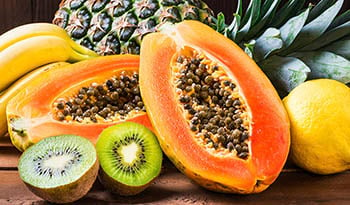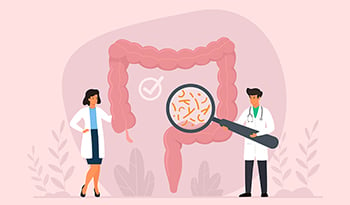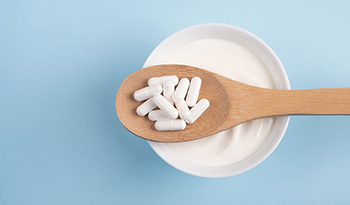Top Supplements for Digestive Health

The gut is pivotal for overall well-being, influencing everything from nutrient absorption to immune function. This article delves into the most effective supplements available to support and enhance gut wellness and practical recommendations for achieving a balanced and healthy digestive system.
The Best Digestion Supplements
Discover the top supplements for digestive health to support optimal gut wellness.
Collagen
Collagen offers several benefits for gut health, thanks to its unique structural properties and amino acid profile. Collagen's amino acids glycine and glutamine are essential for repairing and maintaining the gut lining. This may help prevent and heal conditions like leaky gut syndrome.
Studies show the anti-inflammatory properties of collagen can help reduce inflammation in the gut, which is beneficial for conditions like colitis and diverticulitis. Collagen may help regulate stomach acid secretion and improve the overall digestive process. It also attracts water and acidic molecules, which aids in breaking down food more efficiently.
Collagen can help protect the stomach lining and reduce the risk of developing ulcers. Research has shown that collagen peptides can improve gut barrier function by enhancing the tight junctions in the gut lining, which helps prevent harmful substances from leaking into the bloodstream.
Collagen may also help with bowel regularity, reducing symptoms like constipation and diarrhea.
Incorporating collagen into your diet, whether through supplements or collagen-rich foods like bone broth, can significantly support your gut health.
Probiotics
Probiotics are live microorganisms that can change the composition of your gut microflora. Studies suggest that probiotics may significantly affect the makeup of the gut microbiome and positively impact other areas of health, like immunity.
Research has shown that probiotics help maintain a healthy balance of gut bacteria by increasing the number of beneficial bacteria and reducing harmful ones. This balance is crucial for optimal digestive function.
Probiotics also aid in the breakdown of food and the absorption of nutrients. They help digest lactose, the sugar found in milk, which can be particularly beneficial for people with lactose intolerance.
Probiotics are effective in preventing and treating diarrhea, especially when it's caused by antibiotics. Antibiotics can disrupt the natural balance of gut bacteria, and probiotics help restore it. Probiotics can alleviate symptoms of various digestive disorders, such as irritable bowel syndrome (IBS) and inflammatory bowel disease (IBD). They may help reduce bloating, gas, and constipation.
A healthy gut microbiome supported by probiotics can enhance the immune system, helping to fend off infections and illnesses. Probiotics also strengthen the gut barrier, which prevents harmful substances from entering the bloodstream and causing inflammation.
Try incorporating common sources of probiotics, including fermented foods like yogurt, kefir, sauerkraut, kimchi, and probiotic supplements into your daily routine for optimal gut wellness.
Prebiotics
Prebiotics are fibers that fuel probiotic bacteria growth in the gut. Prebiotics provide "food" meant to promote the growth of beneficial bacteria in the gut microbiome.
Prebiotics are non-digestible fibers that travel to the colon, where they are fermented by gut bacteria. This fermentation process produces short-chain fatty acids that provide energy to colon cells and support overall gut health. Studies show the short-chain fatty acids produced during the fermentation of prebiotics have anti-inflammatory properties, which can help reduce inflammation in the gut and other parts of the body.
By feeding the good bacteria, prebiotics help maintain a healthy balance of gut microbiota, which is essential for efficient digestion and nutrient absorption. Prebiotics can help regulate bowel movements by increasing stool bulk and promoting regularity.
Some excellent sources of prebiotics include garlic, onions, bananas, asparagus, and whole grains. You can also get prebiotics in supplement form. Try adding prebiotics to your supplement routine for digestive health and wellness.
Glutamine
Glutamine is an amino acid that plays a vital role in maintaining gut health. It helps maintain the integrity of the intestinal lining, which acts as a barrier to prevent harmful substances from leaking out of the gut lining.
Glutamine is essential for the growth and repair of the cells lining the intestines. This can be especially beneficial for individuals with gut injuries or those recovering from infections. It also has anti-inflammatory properties that can help reduce inflammation in the gut.
Did you know a significant portion of the immune system is located in the gut? Research has shown that glutamine supports the immune cells in the intestines, helping to fend off infections and maintain overall gut health. It can positively influence the composition of gut microbiota, promoting the growth of beneficial bacteria and reducing harmful ones.
Glutamine can be found in meat, dairy products, eggs, nuts, tofu, and certain vegetables like corn and red cabbage. Glutamine supplements are a good way to ensure you get enough glutamine for optimal gut health.
Slippery Elm
Slippery elm contains mucilage, a gel-like substance that coats the lining of the digestive tract. This protective layer can help reduce irritation and inflammation, making it beneficial for conditions like IBS and gastritis.
By coating the esophagus and stomach lining, slippery elm can help reduce symptoms of heartburn or gastroesophageal reflux disease (GERD). Slippery elm can also help regulate bowel movements by adding bulk to the stool and soothing the digestive tract, helping to keep you more regular.
Studies show the anti-inflammatory properties of slippery elm can help reduce inflammation in the gut, which is beneficial for conditions like Crohn's disease, Celiac disease, and ulcerative colitis.
Incorporating slippery elm into your diet, whether through supplements, teas, or powders, can significantly support your gut health.
Butyrate
Butyrate, a short-chain fatty acid produced by the fermentation of dietary fibers in the colon, offers several benefits for digestive health. It is the primary energy source for the cells lining the colon, meeting about 70% of their energy needs. This helps maintain the health and integrity of the gut lining.
It strengthens the mucosal barrier, which prevents harmful substances from entering the bloodstream and causing inflammation. Butyrate helps reduce inflammation in the gut, which is beneficial for managing GI health.
Research shows that butyrate promotes a healthy balance of gut bacteria, encouraging the growth of beneficial microbes and inhibiting harmful ones. It also helps regulate bowel movements by modulating gut motility, which can prevent constipation and promote regularity.
Furthermore, Butyrate supports the immune system by enhancing the function of immune cells in the gut.
Incorporating fiber-rich foods like fruits, vegetables, whole grains, and legumes into your diet can help increase butyrate production in your gut. Butyrate supplements are another good option for digestive support and gut wellness.
Curcumin
Curcumin, the active compound in turmeric, offers several benefits for the digestive tract. It helps relax the smooth muscles in the intestines, which aids in moving food through the digestive system. This can help prevent gas and bloating discomfort.
Studies show that curcumin has powerful anti-inflammatory properties that can help reduce inflammation in the gut. It has been shown to protect against various digestive disorders, including reflux esophagitis and gastric mucosal damage caused by nonsteroidal anti-inflammatory drugs (NSAIDs).
Incorporating curcumin into your diet, either through turmeric-rich foods or supplements, could be a great way to support your digestive health throughout the year.
Digestive Enzymes
Digestive enzymes play a crucial role in breaking down the food we eat into nutrients that the body can absorb and use. They help break down carbohydrates, proteins, and fats more efficiently, reducing symptoms like bloating, gas, and indigestion.
By aiding in the breakdown of food, research shows that digestive enzymes aid your body in absorbing more nutrients from the food you eat, which can help prevent nutritional deficiencies. For individuals with enzyme deficiencies or digestive disorders, taking digestive enzyme supplements can alleviate discomfort and improve overall digestive health.
Conditions like lactose intolerance, pancreatic insufficiency, and certain food intolerances can benefit from specific digestive enzymes like lactase, protease, and lipase. Better digestion and nutrient absorption can lead to increased energy levels, as your body is more effectively utilizing the nutrients from your food.
Incorporating digestive enzyme supplements into your routine can significantly improve your digestive health, especially if you experience frequent digestive issues.
Conclusion
From enhancing gut lining integrity and reducing inflammation to supporting beneficial gut bacteria and improving nutrient absorption, these supplements offer comprehensive benefits for maintaining a balanced and healthy digestive system.
Always consult with your licensed healthcare provider before adding new supplements to your healthcare regimen.
References:
- Schulz RM, Ahuja NK, Slavin JL. Effectiveness of Nutritional Ingredients on Upper Gastrointestinal Conditions and Symptoms: A Narrative Review. Nutrients. 2022;14(3):672. Published 2022 Feb 5. doi:10.3390/nu14030672
- Dossett ML, Cohen EM, Cohen J. Integrative Medicine for Gastrointestinal Disease. Prim Care. 2017;44(2):265-280. doi:10.1016/j.pop.2017.02.002
- Latif A, Shehzad A, Niazi S, et al. Probiotics: mechanism of action, health benefits and their application in food industries [published correction appears in Front Microbiol. 2024 Feb 14;15:1378225. doi: 10.3389/fmicb.2024.1378225]. Front Microbiol. 2023;14:1216674. Published 2023 Aug 17. doi:10.3389/fmicb.2023.1216674
- Davani-Davari D, Negahdaripour M, Karimzadeh I, et al. Prebiotics: Definition, Types, Sources, Mechanisms, and Clinical Applications. Foods. 2019;8(3):92. Published 2019 Mar 9. doi:10.3390/foods8030092
- Liu H, Wang J, He T, et al. Butyrate: A Double-Edged Sword for Health?. Adv Nutr. 2018;9(1):21-29. doi:10.1093/advances/nmx009
- Perna S, Alalwan TA, Alaali Z, et al. The Role of Glutamine in the Complex Interaction between Gut Microbiota and Health: A Narrative Review. Int J Mol Sci. 2019;20(20):5232. Published 2019 Oct 22. doi:10.3390/ijms20205232
- Scazzocchio B, Minghetti L, D'Archivio M. Interaction between Gut Microbiota and Curcumin: A New Key of Understanding for the Health Effects of Curcumin. Nutrients. 2020;12(9):2499. Published 2020 Aug 19. doi:10.3390/nu12092499
- Ianiro G, Pecere S, Giorgio V, Gasbarrini A, Cammarota G. Digestive Enzyme Supplementation in Gastrointestinal Diseases. Curr Drug Metab. 2016;17(2):187-193. doi:10.2174/138920021702160114150137
- Abrahams M, O'Grady R, Prawitt J. Effect of a Daily Collagen Peptide Supplement on Digestive Symptoms in Healthy Women: 2-Phase Mixed Methods Study. JMIR Form Res. 2022;6(5):e36339. Published 2022 May 31. doi:10.2196/36339
DISCLAIMER:This Wellness Hub does not intend to provide diagnosis...
















































































 Table of Contents
Table of Contents















